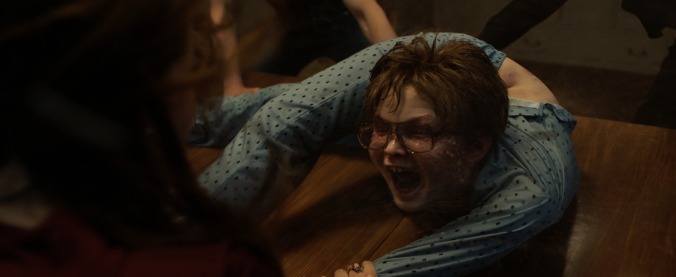The Devil Made Me Do It brings the Conjuring trilogy to a dispiriting close

For all the “this really happened” promises of veracity used to send a few extra chills down the spines of the superstitious and the gullible, the Conjuring movies play pretty fast and loose with the facts, such as they are. Which, if you think about it, is appropriate, given their subjects: the self-described demonologists and paranormal investigators Ed and Lorraine Warren, no strangers themselves to accusations of playing fast and loose, to put it charitably. Why not tweak and embellish a true story when its truth is dubious at best? The Devil Made Me Do It, the third entry in this hit horror franchise, deviates even further than its predecessors, fabricating a whole fictional narrative around a real case. The problem here isn’t the dramatic liberties, though. It’s that they’re much less, well, dramatic than the real events the film leaves curiously off screen: the sensational trial of one Arne Johnson, who made history (and headlines) by insisting in court that he was under demonic influence when he stabbed his landlord to death.
No, the Conjuring hasn’t floated into John Grisham territory, fun as that might be. (We get a plea, the sentencing, and no courtroom theatrics in between.) But this disappointing sequel does stray a little from the template set by James Wan’s supremely effective original and its longer, louder, slightly less effective encore. The Devil Made Me Do It begins the way those movies ended: with unholy forces huffing and puffing and trying to blow a haunted house down. The Warrens, the pious Christian power couple played once more by Patrick Wilson and Vera Farmiga, have arranged an official exorcism for a young boy named David Glatzel (Julian Hilliard), who starts playing an involuntary game of Twister once the praying begins. It’s the kind-hearted Arne (Ruairi O’Connor), fiancé of the kid’s older sister (Sarah Catherine Hook), who lures the culprit out with an offer to claim his soul instead. Lo and behold, the demon comes to collect a few weeks later, taking control of the young man’s stabbing arm, landing him squarely behind bars, and sending the Warrens on a defense-building mission of flashbacks and crime-scene clairvoyance.
Wan, who’s dabbled all over the Conjuring canon (including the adjacent Annabelle series), worked on the story for The Devil Made Me Do It. The film might have benefitted from less of his formulaic plotting and more of his considerable skill behind the camera. Under his stewardship, the first Conjuring was a delectable, even elegant symphony of cheap funhouse tricks; crack timing elevated the lowly jump scare to an art form. Michael Chaves, who previously orchestrated the jolts of marginally related side entry The Curse Of La Llorona, takes over here, injecting some extra ickiness into the spookiness. (There’s a big, bloated corpse staggering around the margins of this movie, in what plays like an audition for a spinoff). But Chaves has none of Wan’s malevolent mojo, his talent for wringing shivery joy-by-way-of-fear from every spring-loaded appearance by the franchise’s growing roster of apparitions. Look, for dispiriting example, at how prematurely he punctures the tension of a seemingly foolproof set piece on a waterbed. Wan plays us—and this material—like an accordion. His replacement plays the notes but not the music.
Anchoring, as always, are Wilson and Farmiga, the Nick and Nora of haunted house cinema. There remains a goofily wholesome appeal to their take on the Warrens, incorruptible sleuths of God with superhero skillsets and the dorky charisma of youth ministers. They’re so painfully square that they’re almost hip. The Devil Made Me Do It supplies the two with a belated Moriarty of sorts, an occultist (Eugenie Bondurant) pulling the strings on the supernatural misfortune that’s struck the Glatzel family. Set in the early ’80s, the film is tapping, with this plot development, into the era’s wave of destructive satanic panic—an uncomfortable cultural itch to scratch during a new era of deluded loonies shouting about cabals of blood-drinking Democrats. The Conjuring series wades into these waters uncritically, with not even the faintest interest in exploring how the hysterical fear of devil worshippers hiding in polite society was, to put it mildly, a bit overblown. Likewise, that the movie never once entertains the possibility that Arne might not be possessed speaks to how fully the series adheres to the Warrens’ narrative, to their version of events. (You’d never guess, watching these films, the skepticism the two provoked even within their own community of ghost- hunters, busters, and adventurers.)
There’s almost no real subtext in The Conjuring, which can be oddly refreshing, given how often movie monsters turn out to be bald metaphors for something else (usually grief) these days. In this unambiguously Catholic franchise, good is good, evil is evil, and the difference can’t be missed. What even the better entries in the series fail to approach, though, is anything resembling genuine moral danger—the hint of temptation or doubt or the gaping maw of damnation. For all the talk of souls at stake, Wan’s bottomless clown car of shadowy phantoms poses an almost strictly physical threat, to the point where they can even be blown away by shotgun. It’s the difference between a well-oiled contraption and a horror movie that really gets under your skin. The Devil Made Me Do It is neither, no matter how much and how mechanically it trots out the jack-in-the-boxes tactics of the films that came before it, to say nothing of an aspirational shot of a holy man standing outside a house, framed to resemble an iconic ancestor in the demon-evicting business.